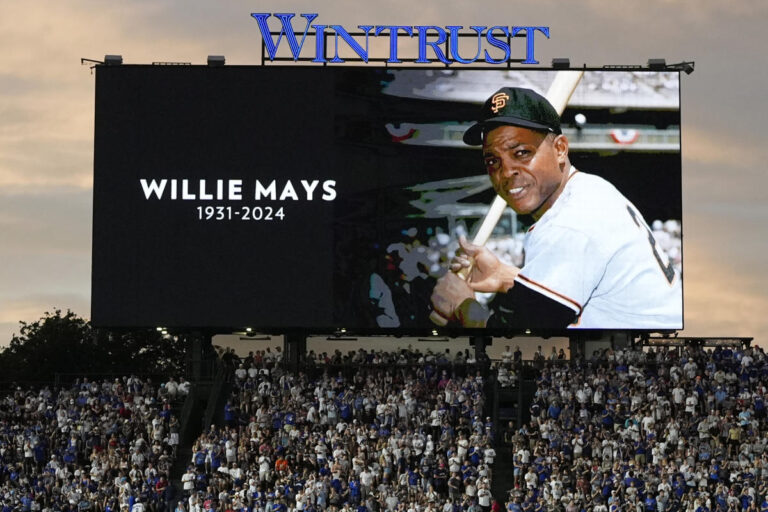Some of the best players of their era and some of the greatest players in baseball history.
Willie Mays did both at the highest level.
Mays, who died Tuesday at age 93, was everything you could want not just as a superstar but as a person, and he endeared himself to people in New York, San Francisco and across the country with the swagger, talent and grace he displayed during more than four decades on the baseball field.
Mays was the greatest baseball player the world has ever seen, and maybe still will be, and when you look at the “Say Hey Kid”‘s list of accomplishments and accolades, it’s hard to imagine any player could have accomplished all that he did in his 23-year playing career.
-
1951 National League Rookie of the Year
-
1954 World Series Champions
-
3,293 Hits
-
660 home runs
-
12 Gold Glove Awards
-
2x National League MVP Award
-
24 All-Star Game selections
Offensively, Mays was a force at the plate: he became just the second player in MLB history to join the 600-home run club after Babe Ruth, and his 660 career home runs still rank sixth all-time.
Defensively, Mays was unmatched. He was arguably the greatest center fielder in baseball history. Before Ken Griffey Jr., Andrew Jones and Torii Hunter, there was Mays, who roamed the Polo Grounds and its vast center field like a gazelle, making the impossible look ordinary. His 12 Gold Glove Awards as a center fielder are the most ever won by a player at the position.
Mays’ over-the-shoulder catch to stop Vic Wirtz’s game-winning hit more than 500 feet from home plate during the 1954 World Series is considered the greatest catch in baseball history. Seven decades later, it’s still known simply as “The Catch.”
Red Sox great Ted Williams was as good as any player who ever played for the team and is enshrined in the Baseball Hall of Fame in Cooperstown. But Williams also made what may have been the most accurate statement in baseball history: “They invented the All-Star Game because of Willie Mays.”
Mays, who wears the No. 24 jersey, has been nominated for an All-Star game 24 times, more than any other player, including longtime friend Hank Aaron, who has 25. Mays’ ability to maintain greatness for such a long period of time should never be taken for granted.
It’s all too easy to call Mays a legend, not because the term is wrong or disrespectful, but because it simply doesn’t do justice to arguably the greatest baseball player of all time.
It would also be remiss not to point out that Mays’ prominence came at a time when black players faced incredibly difficult challenges dealing with prejudice, racism and a society that didn’t accept them as human beings. Debuting four years after Jackie Robinson broke the MLB’s color barrier, Mays was not only one of baseball’s first black superstars, but also one of the first black superstars in American professional sports, and his ability and class resonated with black sports fans across the country.
Mays was your favorite player’s favorite player, and that stuck with him for decades, during his playing days and after his retirement. When Mays played, he did so with a joy, energy and passion that resonated with generations of baseball fans and players. The reaction of the fans who watched him play for 23 years was the same as the reaction of the players who grew up following him. The respect and gratitude for all that Mays meant to the baseball world never faded.
At the age of 15, Mays played for the Birmingham Black Barons at Rickwood Field and began a long and successful journey to become one of baseball’s all-time greats, and in the process, he left the baseball world, and the world, in a much better state than when he found it.
And even after a Hall of Fame career, that’s what made Mays great: in a room full of the best players in the world, and everyone knew he was the best while he was playing and after he played.
Willie Mays was not just a legend, he will forever be an icon.


